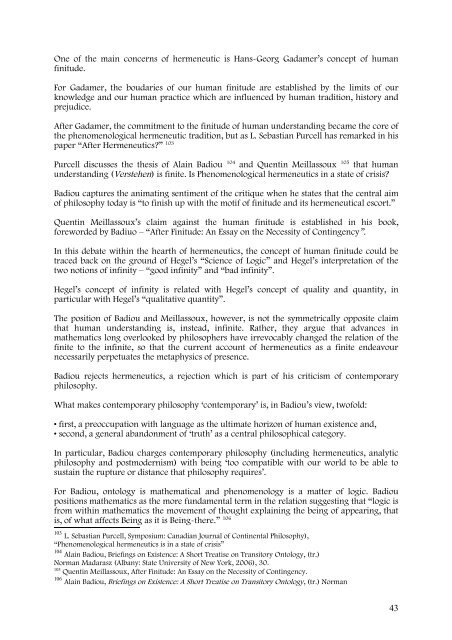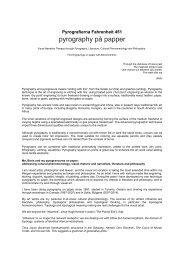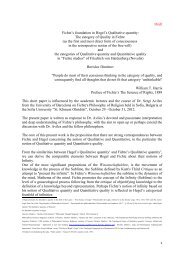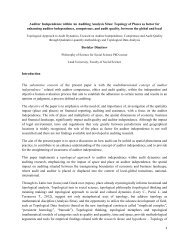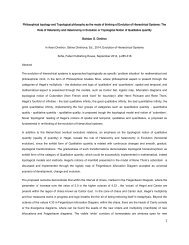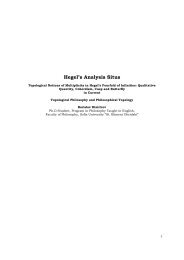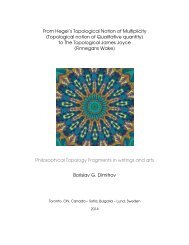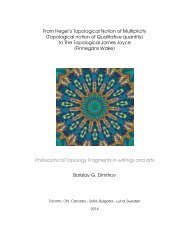Topological Ontology and Logic of Qualitative quantity
Qualitative quantity and BFO (Basic Formal Ontology) of /Barry Smith/ and YAMATO (Yet Another More Advanced Top-level Ontology) of /Riichiro Mizoguchi/
Qualitative quantity and BFO (Basic Formal Ontology) of /Barry Smith/ and YAMATO (Yet Another More Advanced Top-level Ontology) of /Riichiro Mizoguchi/
- No tags were found...
Create successful ePaper yourself
Turn your PDF publications into a flip-book with our unique Google optimized e-Paper software.
One <strong>of</strong> the main concerns <strong>of</strong> hermeneutic is Hans-Georg Gadamer’s concept <strong>of</strong> human<br />
finitude.<br />
For Gadamer, the boudaries <strong>of</strong> our human finitude are established by the limits <strong>of</strong> our<br />
knowledge <strong>and</strong> our human practice which are influenced by human tradition, history <strong>and</strong><br />
prejudice.<br />
After Gadamer, the commitment to the finitude <strong>of</strong> human underst<strong>and</strong>ing became the core <strong>of</strong><br />
the phenomenological hermeneutic tradition, but as L. Sebastian Purcell has remarked in his<br />
paper “After Hermeneutics” 103<br />
Purcell discusses the thesis <strong>of</strong> Alain Badiou 104 <strong>and</strong> Quentin Meillassoux 105 that human<br />
underst<strong>and</strong>ing (Verstehen) is finite. Is Phenomenological hermeneutics in a state <strong>of</strong> crisis<br />
Badiou captures the animating sentiment <strong>of</strong> the critique when he states that the central aim<br />
<strong>of</strong> philosophy today is “to finish up with the motif <strong>of</strong> finitude <strong>and</strong> its hermeneutical escort.”<br />
Quentin Meillassoux’s claim against the human finitude is established in his book,<br />
foreworded by Badiuo – “After Finitude: An Essay on the Necessity <strong>of</strong> Contingency”.<br />
In this debate within the hearth <strong>of</strong> hermeneutics, the concept <strong>of</strong> human finitude could be<br />
traced back on the ground <strong>of</strong> Hegel’s “Science <strong>of</strong> <strong>Logic</strong>” <strong>and</strong> Hegel’s interpretation <strong>of</strong> the<br />
two notions <strong>of</strong> infinity – “good infinity” <strong>and</strong> “bad infinity”.<br />
Hegel’s concept <strong>of</strong> infinity is related with Hegel’s concept <strong>of</strong> quality <strong>and</strong> <strong>quantity</strong>, in<br />
particular with Hegel’s “qualitative <strong>quantity</strong>”.<br />
The position <strong>of</strong> Badiou <strong>and</strong> Meillassoux, however, is not the symmetrically opposite claim<br />
that human underst<strong>and</strong>ing is, instead, infinite. Rather, they argue that advances in<br />
mathematics long overlooked by philosophers have irrevocably changed the relation <strong>of</strong> the<br />
finite to the infinite, so that the current account <strong>of</strong> hermeneutics as a finite endeavour<br />
necessarily perpetuates the metaphysics <strong>of</strong> presence.<br />
Badiou rejects hermeneutics, a rejection which is part <strong>of</strong> his criticism <strong>of</strong> contemporary<br />
philosophy.<br />
What makes contemporary philosophy ‘contemporary’ is, in Badiou’s view, tw<strong>of</strong>old:<br />
• first, a preoccupation with language as the ultimate horizon <strong>of</strong> human existence <strong>and</strong>,<br />
• second, a general ab<strong>and</strong>onment <strong>of</strong> ‘truth’ as a central philosophical category.<br />
In particular, Badiou charges contemporary philosophy (including hermeneutics, analytic<br />
philosophy <strong>and</strong> postmodernism) with being ‘too compatible with our world to be able to<br />
sustain the rupture or distance that philosophy requires’.<br />
For Badiou, ontology is mathematical <strong>and</strong> phenomenology is a matter <strong>of</strong> logic. Badiou<br />
positions mathematics as the more fundamental term in the relation suggesting that “logic is<br />
from within mathematics the movement <strong>of</strong> thought explaining the being <strong>of</strong> appearing, that<br />
is, <strong>of</strong> what affects Being as it is Being-there.” 106<br />
103<br />
L. Sebastian Purcell, Symposium: Canadian Journal <strong>of</strong> Continental Philosophy),<br />
“Phenomenological hermeneutics is in a state <strong>of</strong> crisis”<br />
104<br />
Alain Badiou, Briefings on Existence: A Short Treatise on Transitory <strong>Ontology</strong>, (tr.)<br />
Norman Madarasz (Albany: State University <strong>of</strong> New York, 2006), 30.<br />
105<br />
Quentin Meillassoux, After Finitude: An Essay on the Necessity <strong>of</strong> Contingency.<br />
106<br />
Alain Badiou, Briefings on Existence: A Short Treatise on Transitory <strong>Ontology</strong>, (tr.) Norman<br />
43


